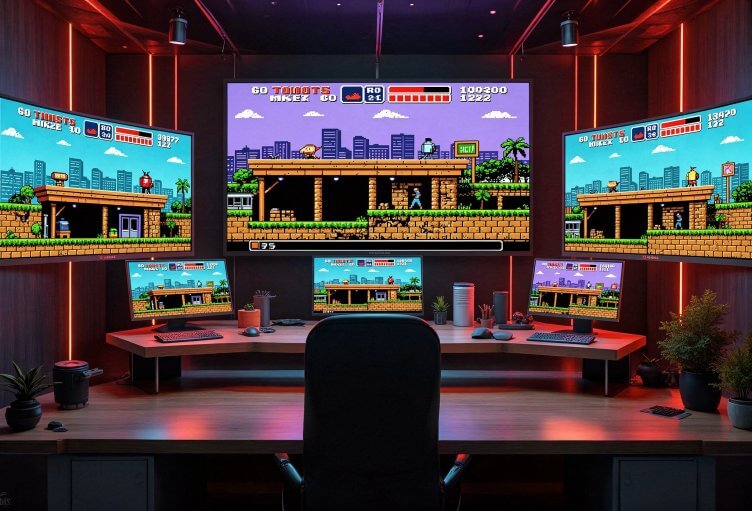Monetization is one of those things every studio has to deal with, even if nobody really loves talking about it. Games need to earn money somehow, and there are a bunch of ways to do it — optional items, small upgrades, ads here and there, maybe a subscription if it makes sense. None of it works if players feel pushed around, so the tone has to be right.
Different game monetization strategies fit different players. Some players buy cosmetics to get an original look, others would spend money if it gets them closer to the objective faster. And plenty of people won’t spend a cent unless they’ve really connected with the game first.
Developers who pay attention to those habits usually end up in a better spot. Instead of building a system around pressure, they add things that match what players were already doing or wanting. And when that happens, the spending feels less like a barrier and more like a choice people are comfortable with.
Why Is It Important to Monetize Games?
Games aren’t a small hobby market anymore. They’ve grown into one of the biggest entertainment industries out there, worth roughly 197 billion dollars a year. Mobile titles alone bring in more than 91 billion, which explains why so many studios put real thought into how to monetize a game in a way that actually works for their audience.
Not every game can rely on the same approach. A premium story-driven title has totally different expectations than a quick mobile puzzle game. Some teams stick to a basic paid download, while others add optional purchases or sprinklings of ads if it suits the audience. It really comes down to choosing what matches the game itself rather than trying to apply one universal model to everything.
Game Monetization Models Explained
Studios use all kinds of approaches to earn money from their games, and there’s no single formula that works for everyone. One project might be built around a simple upfront purchase, another might lean on long-term updates, and some mix things in ways that don’t fit neatly into any category. A lot of it comes down to the tone of the game and what the players expect from it.
Some games keep things simple and just charge once, others grow and change over time. Studios end up using all sorts of approaches to earn money from their games, and there’s rarely a single rule that covers them all. Some titles work fine with a one-time purchase, others slowly build a community and add ways for players to support the game as it grows. It often depends less on theory and more on what kind of experience the team is actually building.
Different genres, different budgets, different audiences – they all push things in their own direction. That’s why the market is full of mixed approaches rather than one perfect pattern everyone follows. Here are a few of the models you’ll see most often, each used for its own reasons.
1. Pay-to-Download Model (P2D):
Players purchase the game upfront and unlock the full experience at once. There are no required payments tied to progression after installation. Revenue is generated primarily at the point of sale rather than through ongoing in-game transactions.
2. Free-to-Play (F2P) Model:
The game is available at no initial cost. Income is generated later through optional purchases such as cosmetic items, in-game currency, or convenience features. This structure is widely used in mobile and online titles where updates and retention systems continue after launch.
3. Pay-to-Win Model (P2D):
In this setup, spending money can influence competitive strength or progression speed. Purchases may provide direct gameplay advantages rather than purely cosmetic benefits. While viable in certain markets, this approach often affects how balance and fairness are perceived by players.
Because spending can directly influence strength or progression speed, competitive balance may shift toward paying users. In practice, this often changes match dynamics and progression pacing, particularly in PvP environments. Player perception tends to vary depending on how large the advantage is and whether similar outcomes can still be achieved through time investment alone.
Features of Mobile Game Monetization
Keeping players around is what really moves the needle for a game’s revenue. When people feel connected to a game, they tend to support it in whatever way makes sense for them, and that’s especially true on mobile where mobile game monetization strategies change constantly.
There’s no magic trick here – just a mix of approaches that studios keep coming back to because they’ve worked well enough over time. Here are a few of the common ones you’ll see.
1. In-App Purchases (IAP)
IAPs are a popular method of monetization where players buy virtual goods or currency within the game. Offer various IAP options, ensuring they enhance the gaming experience without being essential for progress:
- buying gems, cosmetics;
- in game currencies;
- character purchase;
- buying boosts, etc.;

2. Ad Monetization
Integrating ads into your game can provide a steady game revenue. Consider implementing rewarded ads, where players receive in-game rewards for watching ads voluntarily.
3. Subscription Model
Subscription-based monetization offers players exclusive perks and content for a recurring fee. This approach can foster long-term player loyalty and a predictable revenue stream:
- buying premium subscription game;
- pass purchase;
- VIP status purchase;
- battle passes.

4. Loot Boxes and Gacha Mechanics
Loot boxes and gacha mechanics can excite players as they anticipate valuable rewards. However, ensure these mechanics are fair and transparent to maintain player trust.

5. Limited-Time Events and Sales
Organize special in-game events or sales with exclusive rewards. Limited-time offers can create a sense of urgency, encouraging players to make purchases:
- monetized timer;
- monetized continue button;
- monetized retry button etc.
6. Offering Early Access
Providing early access to upcoming game content or features can incentivize players to support your game financially.
How To Maintain a Positive Reputation While Generating Revenue
Monetization choices affect player trust over time. Once that trust is damaged, it’s difficult to rebuild, so revenue systems need to be designed with long-term impact in mind. The following principles will help you maintain a positive reputation while generating revenue:
1. Clear Purchase Information
Players should immediately understand what they are buying and how it affects gameplay. Hidden mechanics or unclear benefits usually lead to backlash rather than higher retention.
2. Playable Without Payment
Core progression should remain viable without spending. If non-paying users feel locked out of meaningful content, community sentiment shifts quickly.
3. Controlled Competitive Advantage
When purchases influence power or match outcomes, the effect needs to be measured. Small boosts may be tolerated; large gaps tend to create friction and churn.
4. Responsible Data Handling
Account security and personal data protection are part of operational stability. Clear access controls, secure storage, and compliance with regional privacy regulations reduce legal exposure and protect player trust over time.
How To Increase Mobile Game Monetization?
Monetization improves when it’s tied to how players actually use the game. It rarely works when added as an afterthought. We want to share with you some practical strategies on how to make a good mobile game and how to increase monetization in mobile games:
- 1. Understand player patterns
- Retention curves, session frequency, and spending timing usually show where revenue opportunities exist. Assumptions tend to be less reliable than usage data.
- 2. Design IAP around the core loop
- Purchases that extend or personalize the experience tend to perform better than ones that replace progression entirely. Cosmetic layers and convenience features often age better than power-heavy upgrades.
- 3. Keep the free experience playable
- If early gameplay feels restricted without payment, conversion drops later. A stable free layer supports long-term monetization.
- 4. Use ads carefully
- Rewarded placements typically create less friction than forced formats. Frequency and timing matter more than volume.
- 5. Test instead of guessing
- Pricing, bundles, and timing usually require iteration. Small controlled tests reveal more than large redesigns.
- 6. Tie offers to meaningful content
- Limited-time events or bundles work when they connect to gameplay updates, not just urgency.
- 7. Consider recurring models when updates are ongoing
- Subscriptions make sense when there’s a steady content cadence. Without that, churn increases quickly.
- 8. Protect competitive balance
- When spending directly affects outcomes, player sentiment shifts. The impact depends on how strong the advantage is.
- 9. Update consistently
- Retention supports revenue. New content, balance changes, and technical improvements all contribute to keeping players active.

Examples of Bad Monetization in Games
Certain monetization structures can generate short-term revenue while negatively affecting long-term retention or brand perception. The impact usually depends on implementation rather than the mechanic itself. Let’s explore some examples of bad monetization practices in games:
1. Pay-to-Win Mechanics.
When spending directly alters competitive strength or progression speed in a significant way, balance can shift toward paying users. This often changes how fairness is perceived, especially in PvP environments.
2. Loot Boxes and Gacha Mechanics.
Systems based on paid random drops can increase revenue volatility and raise regulatory or perception risks, particularly if probabilities are unclear. Some countries prohibited such mechanics by law, as it is perceived as gambling.
3. Excessive Purchase Prompts
Frequent or intrusive monetization messages can disrupt gameplay flow and increase churn rather than conversion.
4. High Ad Density
Ad frequency that interrupts core loops tends to reduce session length and retention, even if short-term ad revenue increases.
5. Unclear Pricing Structures
Complicated bundles, hidden renewal terms, or poorly explained subscriptions can create friction and refund requests.
6. High-Pressure Microtransactions
Designs that rely heavily on urgency or scarcity mechanics may increase short-term spending but affect long-term player sentiment.
7. Hard Progression Gates
Blocking core progress behind mandatory spending can limit organic retention and reduce the player base over time.
8. Ignoring Community Signals
When monetization concerns are raised repeatedly and not addressed, community trust typically declines.
9. Lack of Value in Purchases
Pricing that doesn’t match perceived in-game value reduces repeat purchases.
10. Exploitative Monetization in Children’s Games
Games aimed at children require clear pricing, simple purchase flows, and visible parental controls. Age-related regulations vary by region, so compliance needs to be reviewed early rather than added later. Poorly designed purchase systems in this segment can lead to complaints, refund requests, or platform intervention.
Sustainable monetization usually depends on retention and player confidence. If the spending model feels predictable and fair, players tend to stay longer. Short-term revenue spikes driven by pressure tactics often come at the cost of churn and negative sentiment.

Top Game Monetization Strategies
Video game monetization takes a lot of different shapes. Big titles tend to figure out whatever works for their own players rather than follow one set approach. Some games stick to occasional cosmetic drops. Others add content only when it fits the update cycle. Many fall somewhere in between, often without a strict plan behind it. Monetization tends to make more sense when viewed through real examples rather than broad theory.
What helps is to look at the games that tried and found the best monetization methods. If you want to dig into how some of the most successful games handle their revenue, we’ve already broken a few of them down in separate articles:
- How much money does Candy Crush make?
- How much money does Fortnite make?
- How does Pokémon Go make money?
- How does Call of Duty make money?
- How does Minecraft make money?
Kevuru Games Expertise in Games Monetization
Kevuru Games, a gaming company with 11 years of experience in the market as iOS game developers and Android game development services. Our mission is to provide game publishers with full-cycle game development production and give our clients player-centric advice as to strategies for in-game monetization. With these years of experience and a deep understanding of the gaming ecosystem, we know how to make the game to get the best out of monetization in the post-production stage.
All in all, we offer a full range of mobile game development services, including:
Fully executed development;
Concept art and design;
Quality assurance and testing;
Game monetization or ads in video games;
Localization of the game;
Post-release support.
Game monetization rarely follows a single formula. Gaming metrics and player behavior often push monetization in directions that weren’t part of the original plan. What works for one title doesn’t automatically transfer to another.
Looking at usage data, competitive benchmarks, and genre patterns tends to give a more realistic starting point than relying on theory. Decisions grounded in context usually age better than fixed formulas.
One of the key aspects of successful game monetization is the integration of non-intrusive and engaging video games or in app advertising formats. Ad formats are selected based on how they fit into the game loop rather than being inserted independently. Placement and timing are adjusted to avoid interrupting core gameplay while still supporting revenue targets.
Player behavior, session length, and revenue data tend to show what’s actually happening, rather than what was expected. Regular review of these numbers makes it easier to see where something isn’t working — whether that’s ad timing, pricing, or offer placement — and adjust before small issues grow into larger retention problems.
Whether your video game falls into the action, puzzle, simulation, or RPG genre, whether it’s a mobile game, mobile apps or multiplayer games we will help you develop the perfect monetization strategy (for different game genres require different approaches).
Monetization trends don’t stay fixed. Platform policies change, player tolerance shifts, and regulations get updated. Revenue systems usually need to adjust alongside those changes rather than sticking to the original setup.
Summary
Monetization works better when it reflects actual player behavior. Engagement patterns, app game development costs, and retention data tend to shape revenue decisions more than predefined plans. Projects that balance financial goals with stable gameplay systems are more likely to maintain both revenue and reputation over time.







